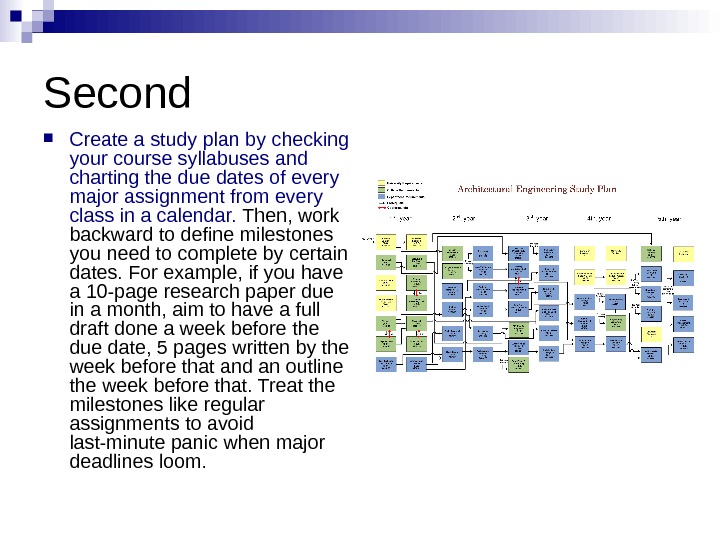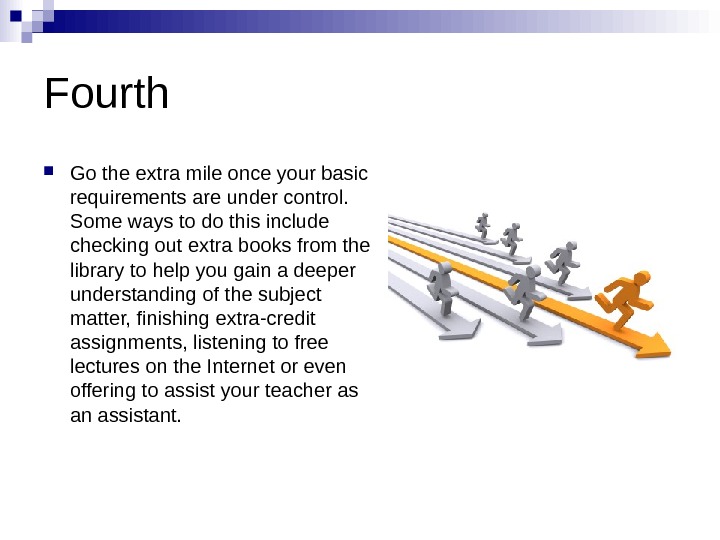How to Be a Good Student Instructions







how_to_be_a_good_student_artamonova_liya.ppt
- Размер: 1 Mегабайта
- Количество слайдов: 6
Описание презентации How to Be a Good Student Instructions по слайдам
 How to Be a Good Student Instructions
How to Be a Good Student Instructions
 Improvement Improve your study habits, motivation and organizational skills to improve the quality of your learning at school, regardless of whether you are just starting a new school year or need a fresh start in the middle of a semester. When you have a reason to care — such as a need for good grades, a desire to qualify for a good school or scholarship or a fascination with the subject material — you can use it to motivate yourself to develop the habits that will make you a good student.
Improvement Improve your study habits, motivation and organizational skills to improve the quality of your learning at school, regardless of whether you are just starting a new school year or need a fresh start in the middle of a semester. When you have a reason to care — such as a need for good grades, a desire to qualify for a good school or scholarship or a fascination with the subject material — you can use it to motivate yourself to develop the habits that will make you a good student.
 First Minimize your commitments to make sure your schedule is free enough to allow a balanced lifestyle of thorough study, sufficient sleep and regular exercise and recreation. Many people overestimate how much they can get done in a day. If you are overworked, seriously consider dropping an optional club or activity. To overcome fear of disappointing people, remind yourself that a few things done with excellence will be more satisfying than many things left undone.
First Minimize your commitments to make sure your schedule is free enough to allow a balanced lifestyle of thorough study, sufficient sleep and regular exercise and recreation. Many people overestimate how much they can get done in a day. If you are overworked, seriously consider dropping an optional club or activity. To overcome fear of disappointing people, remind yourself that a few things done with excellence will be more satisfying than many things left undone.
 Second Create a study plan by checking your course syllabuses and charting the due dates of every major assignment from every class in a calendar. Then, work backward to define milestones you need to complete by certain dates. For example, if you have a 10 -page research paper due in a month, aim to have a full draft done a week before the due date, 5 pages written by the week before that and an outline the week before that. Treat the milestones like regular assignments to avoid last-minute panic when major deadlines loom.
Second Create a study plan by checking your course syllabuses and charting the due dates of every major assignment from every class in a calendar. Then, work backward to define milestones you need to complete by certain dates. For example, if you have a 10 -page research paper due in a month, aim to have a full draft done a week before the due date, 5 pages written by the week before that and an outline the week before that. Treat the milestones like regular assignments to avoid last-minute panic when major deadlines loom.
 Third Schedule a specific time each day for studying, reading and working on assignments. Alternate 20 to 30 minutes of working with 5 — to 10 -minute breaks to keep your mind fresh and alert. Do your best to avoid other activities during your allotted study times; keeping them consistent will begin to build habits and train your brain to move into study mode at certain times and in certain settings.
Third Schedule a specific time each day for studying, reading and working on assignments. Alternate 20 to 30 minutes of working with 5 — to 10 -minute breaks to keep your mind fresh and alert. Do your best to avoid other activities during your allotted study times; keeping them consistent will begin to build habits and train your brain to move into study mode at certain times and in certain settings.
 Fourth Go the extra mile once your basic requirements are under control. Some ways to do this include checking out extra books from the library to help you gain a deeper understanding of the subject matter, finishing extra-credit assignments, listening to free lectures on the Internet or even offering to assist your teacher as an assistant.
Fourth Go the extra mile once your basic requirements are under control. Some ways to do this include checking out extra books from the library to help you gain a deeper understanding of the subject matter, finishing extra-credit assignments, listening to free lectures on the Internet or even offering to assist your teacher as an assistant.

